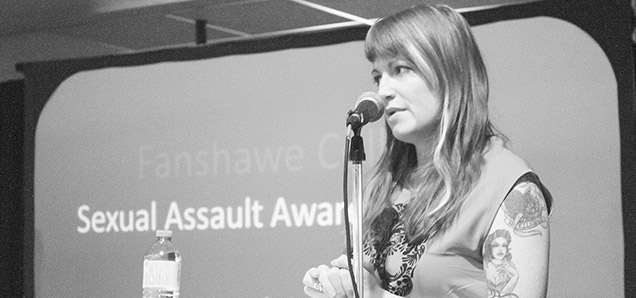Help for people in abusive relationships
 CREDIT: STEPHANIE LAI
CREDIT: STEPHANIE LAIHeather Jarvis, co-founder of SlutWalk Toronto, stopped by Forwell Hall to speak to students about sexual violence during the Fanshawe Student Union�s Sexual Awareness Days on campus.
Harsh realities are all around us, including abuse in relationships. You might have heard of a toxic relationship, know of someone who's been in one, or even experienced one yourself. Either way, it is something that should never happen, but unfortunately, it does. Partner abuse is something that can happen in even the most rosy-looking of intimate relationships. And there's something else, too: it happens to women and men.
But the facts don't lie, that women and children are still victimized the most in an abusive situation. On average, a woman is killed every six days by her intimate partner in Canada.
Saundra-Lynn Coulter is the program manager at the London Abused Women's Centre. She said it can be hard for someone to realize that they're a victim in an abusive intimate relationship. “Sometimes people have grown up thinking, ‘Well, if you're not being hit or if it's not a sexual assault, then it's not really abuse.' That's not the reality,” she explained. “The reality is that abuse is much broader than that, so it could be for example financial abuse, taking your pay cheque from you; it could be forcing you into prostitution. It could be verbal abuse; really horrific verbal putdowns and threats, like threatening children and threatening pets. There's really a broad spectrum.”
Conceiving why a person would choose to stay with their partner in a toxic situation is more complicated than it may seem. Put yourself in her shoes for a second; you may feel intimidated, afraid, and even embarrassed to seek immediate help.
Coulter stated that it's common for women to choose not to get help at all. “Often people don't want to. They have a vested interest; they care about the person,” she said. “They're usually in love with the person, they may have been with the person for a long time, they may have children that they have together, they may be pregnant; all kinds of reasons.”
Like many unfortunate truths, it's hard to understand why this happens. Finding reasons that explain violent behavior towards a loved one can be hard, but Coulter said that in many cases, there is indeed an underlying tendency.
Many of the men perpetrating abuse in relationships were nurtured with such behavior from a young age, she said. “Many of the men who are abusive now grew up in homes where they witnessed abuse of all kinds, physical and otherwise, of their moms ... Some studies have followed boys who witnessed their mom being abused, and about 50 per cent of them go on to be abusive to their partners ... so sometimes it's learned behavior; we've taught our kids and modeled for them that it's okay for them to do that.”
Abuse doesn't happen only in spousal situations. The highest rates of abuse towards women happen between the ages of 16 and 24. They could be dating or even just casually seeing their abusive partners.
Coulter knows the vulnerabilities that young people face, particularly the ones coming to college right out of high school and living on their own, and she said she believes women should educate themselves about the dangers, just as a precaution. “Women who are going to college initially, they face the potential of assault — sexual assault, and assault by an intimate partner at quite a high rate. To know that this can happen to anyone, and that there are resources available to them, and to learn as much as they can about this, and connect with their friends in saying, ‘How do we protect each other?' (is a good thing).”
Although not nearly as common, the issue of male abuse does also rear its ugly head.
Jonathan Schmidt is a psychotherapist for Family Service Thames Valley, and he has dealt with men who have been victimized. Like women, he encouraged men in abusive relationships to seek help. “If a man realizes that he's being abused, there are a number of things he can do,” he explained. “If he feels safe to do so, he should tell his partner, man or woman — intimate partner violence happens in same sex-relationships too — about what hurt him or made him feel disrespected.”
“He could also initiate couples counselling by calling us at Family Service Thames Valley and requesting an intake. All victims of abuse should know that they are not responsible for being abused; however, they can take more responsibility for their safety.”
Schmidt acknowledged that it's hard to explain why there isn't more of a spotlight on the side of men being victimized. “This is a complex issue and I'm sure I don't have the whole answer,” he said. “Being a victim seems to be at odds with our stereotypes of men — ‘men are tough,' ‘men are in control,' ‘men like sex.' However, we're seeing an increasing awareness that men can be abused in relationships and that they can be sexually abused as children, or assaulted as adults. High-profile athletes such as Sheldon Kennedy, Theo Fleury and R.A. Dicky have admitted to being sexually abused as children and this and other high-profile cases, such as the church, Boy Scouts, and the Penn State scandal, raise the awareness that men can be abused.”
No matter who you are, you have the right to live a safe and comfortable life. Being in an intimate relationship with someone should be an enjoyable, meaningful experience. If you find yourself in an abusive situation or know of someone who's looking for help, get in touch with the London Abused Women's Centre at 519- 432-2204 or Family Services Thames Valley at 519-433-0700.













